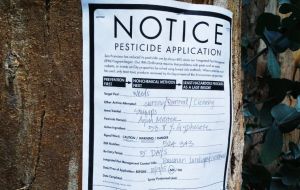MercoPress. South Atlantic News Agency
French mayors propose pesticide-free buffer zones around residential areas
 Environment Minister Elisabeth Borne said she has started work on legislation to create residential buffer zones for the pesticides
Environment Minister Elisabeth Borne said she has started work on legislation to create residential buffer zones for the pesticides  A ban on the use of glyphosate and other commercial pesticides in public spaces such as parks has been in place since January 2017
A ban on the use of glyphosate and other commercial pesticides in public spaces such as parks has been in place since January 2017 France is looking at introducing pesticide-free buffer zones around housing areas after several local mayors defied the government by banning weed killers such as glyphosate in their towns.
A World Health Organization agency said in 2015 that glyphosate probably causes cancer and French President Emmanuel Macron has promised to ban it by 2021 nationwide - leading to an outcry among farmers who say they need alternatives.
Environment Minister Elisabeth Borne said she has started work on legislation to create residential buffer zones for the pesticides.
“There must be a minimum distance between residential areas and pesticide spraying. I will consult in the coming days,” Borne said on France Inter radio. “This legislation will apply nationwide, but will include the possibility to adapt it to local circumstances”.
A ban on the use of glyphosate and other commercial pesticides in public spaces such as parks has been in place since January 2017, and was extended to include private residences and gardens this year.
The government initiative comes after an administrative court in Rennes, western France, ruled on Monday that Daniel Cueff, mayor of Langoulet, had overstepped his authority as he banned spraying pesticides within 150m of residential housing in his village.
Langoulet is one of about 20 municipalities - including Dijon in eastern France, Saint-Jean in the south, Fontoy in the north and Gennevilliers near Paris - that have banned the use of pesticides, with about five of them targeting glyphosate specifically.
On France 3 Bretagne television Cueff said he would appeal the Rennes court verdict and would call on several other mayors to impose similar bans.
Asked about pesticides regulation, Macron said last week that national legislation needs to be respected but he added that he supported the Langoulet mayor's intentions and promised to tighten regulation as soon as possible.
“There is an impact on public health that is undeniable, so we need to change the law ... we need to do it now, very quickly,” Macron told news site Konbini ahead of the G7 meeting in Biarritz last weekend.
Meanwhile, the French mayors plan to keep pressure on the government and are organizing a meeting in coming months to discuss further actions.
“So far, we don't see government action, so it's just words,” said a spokeswoman for the mayor's office in Gennevilliers.
Farmers say a blanket ban would lead to a loss of yields and damage plots.
“Pests will nest like wild boars,” local farmers union FDSEA35 said in a statement, calling for dialogue about the use of phytosanitary products instead.




Top Comments
Disclaimer & comment rulesCommenting for this story is now closed.
If you have a Facebook account, become a fan and comment on our Facebook Page!